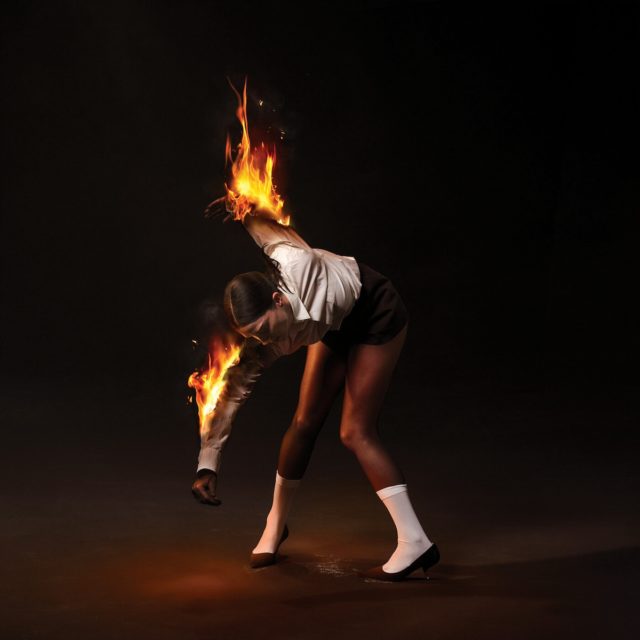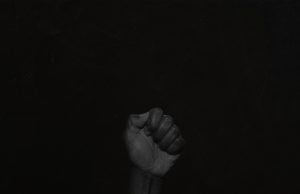THE EDITED PRESS RELEASE: “There is a figure staggering down the street, lurching through a skewed landscape toward a grim new beginning. Rabid, man-sized; disconsolate and grieving in the violent daylight, the smell of death alive on her clothes. No mask, no costume. In fact — though try not to stare — her office wear is somewhat askew. Even her language is ruptured: what was once tightly refined is now impressionistic and felt. No wonder: “I find myself at the precipice of life and death, and reckoning with that,” says Annie Clark, the musician better known as Grammy-winning iconoclast St. Vincent, on the cusp of releasing her seventh album.
Ever since she covered Big Black’s Kerosene live in 2011 and the subsequent cataclysmic 7” split Krokodil / Grot, fans have known that some evil lurked in Clark’s guitar. (Take it back even further if you like: This is someone whose college noise band was named Skull Fuckers.) On All Born Screaming — the first half, at any rate — that lacerating aggression possesses a St. Vincent album for the first time, unleashing a reeling thrash laced with the formative DNA of Steve Albini at his most corrosive and the ugly, spectacular catharsis of Nine Inch Nails, and opening up a brand-new fracture in her songwriting. “It’s my least funny record,” says Clark with knowing wryness.
Brawny lead single Broken Man is unhinged by loss and lust, unveiling our debilitated antagonist in a desperate confrontation that begs “lover nail yourself right to me / If you go I won’t be well / I can hold my arms right open / But I need you to drive the nail.” Reckless loses its footing in the post-loss oblivion. The mischievous Flea casts all-consuming desire as an invasive pestilence. Big Time Nothing is a mordant catwalk sashay through the deafening assault of self loathing. “There is the feeling: I want everything because I feel nothing,” says Clark. “I am bereft. I am in love. But I want more love too. There’s no drugs and abstraction on this record. It’s cut to the pink meat, hungry for life, even if it’s brutal. Because life is brutal.”

For that reason, All Born Screaming is Clark’s first entirely self-produced record (having co-produced all of her previous records). “I had to walk through the fire with this one alone,” she says. “There was no way to find it except sitting with yourself in a room, singing, playing with modular synths, turning knobs, moving electricity around and trying to find those six seconds of lightning in a bottle that I could build an entire song around. I’m obsessed with production. I’ve obviously done it on all of my records, but this time, I wanted to be the first and final filter for this material. It meant sitting with a lot of self-doubt — like Bowie says, ‘when you feel that your feet aren’t quite touching the bottom, you’re just about in the right place to do something exciting.’ ”
Production 101 is knowing the right people for the job, and All Born Screaming boasts “a tight little wrecking crew,” says Clark. “A curated group of rippers.” On Broken Man and Flea, that’s Dave Grohl on drums. (If we’re tracing this virulent seam back through Clark’s work, recall the surviving members of Nirvana inviting her to help induct the band into the Rock And Roll Hall of Fame in 2014.) “Dave is one of the greatest drummers ever because he’s a great songwriter,” says Clark, noting that Grohl heard the “Yes-style prog section” of Flea just three times before he knew “every phase and turnaround. My engineer, Cian Riordan, has a video of me in the studio when Dave was playing. I’m in my chair hearing the first take, and I immediately stand up and, like, my hair is on fire.”
On the immaculately restrained, Portishead-narcotic opener Hell Is Near and the dreamily gone So Many Planets, that’s new Foo Fighters drummer Josh Freese. There’s Justin Meldal-Johnsen (bass), Rachel Eckroth (keys), David Ralicke (brass), Mark Giuliana (drums) and Stella Mozgawa (drums). Then there’s the invaluable contribution of Welsh creative genius Cate Le Bon, who yanked Clark out of the weeds during a period of frustration and self-doubt, and offered stalwart reinforcement, helping her to surmount a few key obstacles. Case in point: Cate shines on the title track, All Born Screaming, a near-seven-minute epic closer propelled by a bassline so perfectly suited that it’s impossible to imagine the song without it. “I had that guitar part but was struggling with the song’s overall tone. Cate listened to it and said ‘Give me a beer, a bass, and three hours’,” and worked out the title track’s puckish low end. “She’s my favorite modern songwriter, period,” says Clark, hinting at future collaborations to come.

As for the life and death we’re dealing with here? The details are immaterial. This isn’t music-as-true-crime designed to be picked apart for clues. On the album’s pivot into the second half, Violent Times, we’re waking up and understanding the stakes have irrevocably changed, and who hasn’t felt that these past however many years? The difference, in the album’s back end, is the realization that we must love one another or die, set to an expansive, enveloping palette that steps back from the guitar offensive: Gainsbourg-worthy grandeur on Violent Times, the “what if someone who loved 2Tone did it all wrong?” of So Many Planets, about the stumbling search for a place to call home. “The first half is reckoning with loss and how life is basically impossible,” says Clark, “but the second half is: But we get to live it so we better fucking dig in.”
Perhaps compassion and hunger can light the way: The Power’s Out is a classically gorgeous St. Vincent portrait of a city’s pushers, parents, racers, and queers waking up to some disaster but finding beauty in the slo-mo confetti cloud of debris. And the racing valediction of Sweetest Fruit exalts individuals who attempted to stake out life’s outer reaches. “Take a big swing and fail, but my God, at least you were trying for transcendence,” says Clark.
Perhaps love can, too. The still life of opener Hell Is Near marks “the beginning / our beginning / begin again.” “That’s the only reason to do something, the reason to live,” says Clark. “Maybe I go the long way around saying that in this record, but at the end of the day it’s a very dark record about love. I have great love in my life. I’m so lucky. I’m not the rat in the maze in that regard any more.” It comes into focus on the back of priority shifts, shuddering sudden dislocations from the culture’s priorities, old disguises dropping to the floor on the title track’s skittish, happy shrug, “all of the wasted nights fighting mortality when in the ashes of Pompeii lovers discovered in an embrace for all eternity”, as she sings on Violent Times.
Unlike the ’70s cosplay of Clark’s previous album, here, there’s no aestheticizing pain or conceptualizing loss. On Daddy’s Home, Clark says she needed to “become the music my father loved in the hope it would heal me, give me the agency as ‘daddy.’ That was probably largely misinterpreted, but I have no regrets — it’s what I needed to do.” With this record, she says emphatically, “I want to fuck people up.” As the title states, we’re All Born Screaming. It’s both a horrifying condition and whaddya-gonna-do acceptance. “If you’re born screaming, that’s a great sign,” says Clark, “because it means you’re breathing. You’re alive. My god. It’s joyous. And then it’s also a protest. We’re all born in protest in a certain way. It’s terrifying to be alive, it’s ecstatic to be alive. It’s everything.”









































